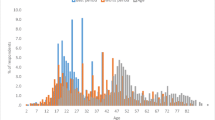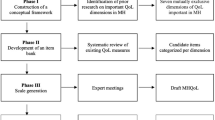Abstract
Background: The conventional question (CQ) on subjective well-being (SWB) is e.g. “How is life?”, with ratings between e.g. ‘Best’ and ‘Worst possible’. Disadvantages may be casualness of responses and biases of proximate, peer or cultural relativity. Alternatively, with Anamnestic Comparative Self-Assessment (ACSA), the scale anchors are the respondents’ self-defined memories of their best and worst periods in life. Thus ACSA uses life review and experiential scale anchors. Objective: To compare the validity, sensitivity and responsiveness of the CQ and ACSA. Method: ACSA and the CQ were administered in parallel to 2584 university-hospital patients suffering from a wide range of psychiatric and somatic diseases. Results: ACSA and CQ did not measure the same construct (r = 0.50). CQ ratings were almost normally distributed, whereas ACSA ratings were overall lower, and clearly positively skewed, suggesting greater sensitivity to the respondents’ diseased state. Contrary to CQ, ACSA ratings of critically ill patients with end-stage liver disease were very low. After life-saving liver transplantation, ACSA ratings increased significantly more than CQ ratings, suggesting better responsiveness of ACSA to objective change. Trait-like socio-demographic variables such as sex, age, and marital status influenced CQ, but not ACSA ratings. Conclusion: In between-subject studies, depending on one’s study objectives, ACSA should be considered as a complement or an alternative to conventional SWB instruments. The CQ is probably preferable when socio-demographic variables are study endpoints. In longitudinal or intervention studies and for intercultural comparisons, ACSA, which reduces the need for correction of several biases or confounders, seems more useful.
Similar content being viewed by others
References
F.M. Andrews S.B. Whithey (1976) Social Indicators of Well-being Plenum Press New York
M. Argyle (2002) The Psychology of Happiness Taylor & Francis Inc New York
Aristotle, Ethica Nicomachea,-Traditional Bekker pagination 1095 a13–b6
J.L. Bernheim (1983) ArticleTitle‘L’auto-évaluation anamnestique comparative (ACSA).I. Description d’une méthode de mesure de la qualité subjective de la vie des malades cancéreux’ Psychologie médicale 15 1615–1617
J.L. Bernheim (1999) ArticleTitle‘How to get serious answers to the serious question: How have you been? Subjective quality of life (QOL) as an individual experiential emergent construct’ Bioethics 13 272–287 Occurrence Handle10.1111/1467-8519.00156
Bernheim, J.L., P. Theuns, M. Mazaheri, Piet Calcoen, F. Heylighen and M. Rose: 2005, ‘Bridging cultural relativity in Quality of Life by Anamnestic Comparative Self Assessment (ACSA)’, Proceedings Australian Quality of Life Conference. http://www.deakin.edu.au/research/acqol/conferences/abstracts_papers/2004/7
J.L. Bernheim M. Buyse (1984) ArticleTitle‘The Anamnestic Comparative Self Assessment for measuring the subjective quality of life of cancer patients’ Journal Psychosocial Oncology 1 25–38 Occurrence Handle10.1300/J077v01n04_03
P. Brickman D. Coates J. Bulman (1980) ArticleTitle‘Influence of extraversion and neuroticism on subjective well-being: Happy and Unhappy people’ Journal of Personality and Social Psychology 38 668–678 Occurrence Handle10.1037/0022-3514.38.4.668
Buyse M., J.L. Bernheim and N. Rotmensz: 1983, L'auto-évaluation anamnestique comparative (ACSA). II. Résultats d'une étude pilote portant sur 65 patients cancéreux. Psychologie médicale 15, pp. 1623–1624
A. Campbell P.E. Converse W.L. Rodgers (1976) The Quality of American Life New York Russell Sage Foundation New York
H. Cantril (1965) The Pattern of Human Concerns Rutgers University Press New Jersey
R.A. Cummins (1996) ArticleTitle‘The domains of life satisfaction: an attempt to order chaos’ Social Indicators Research 38 303–328 Occurrence Handle10.1007/BF00292050
J.C.J.M. Haes ParticleDe (1992) ArticleTitle‘The distinction between affect and cognition in the quality of life of cancer patients: Sensitivity and stability’ Quality of Life Research 1 315–322 Occurrence Handle10.1007/BF00434945
E. Diener M. Diener (1995) ArticleTitle‘Cross-cultural correlates of life satisfaction and self-esteem’ Journal of Personality and Social Psychology 68 653–663 Occurrence Handle10.1037/0022-3514.68.4.653
Erubami, M. and I.R. Young: 2003, ‘Nigerian violence: A review of statistics and perceptions’, Centre for Human Rights Research and Development, CHRRD RESEARCH REVIEW No. 4, http://www.chrrd.kabissa.org/nigeria-violence-review.htm
M. Fayers D. Machin (2000) Quality of Life: Assessment, Analysis and Interpretation John Wiley & Sons New York
M. Garhammer (2002) ArticleTitle‘Pace of life and enjoyment of life’ Journal of Happiness Studies 3 217–256 Occurrence Handle10.1023/A:1020676100938
T.M. Gill A.R. Feinstein (1994) ArticleTitle‘A critical appraisal of the quality of life measurements’ Journal of the American Medical Association 272 619–626 Occurrence Handle10.1001/jama.272.8.619
M.R. Hagerty R.A. Cummins A.L. Ferris K. Land A.C. Michalos M. Peterson A. Sharpe J. Sirgy J. Vogel (2001) ArticleTitle‘Quality of life indexes for national policy: Review and agenda for research’ Social Indicators Research 55 1–91 Occurrence Handle10.1023/A:1010811312332
N. Hampton A. Marshall (2000) ArticleTitle‘Culture, gender, self-efficacy, and life satisfaction: A comparison between Americans and Chinese people with spinal cord injuries’ Journal of Rehabilitation 66 21–28
F. Heylighen J.L. Bernheim (2000a) ArticleTitle‘Global progress. I: Empirical evidence for ongoing increases in quality of life’ Journal of Happiness Studies 1 323–349 Occurrence Handle10.1023/A:1010099928894
F. Heylighen J.L. Bernheim (2000b) ArticleTitle‘Global progress. II: Evolutionary mechanisms and their side-effects’ Journal of Happiness Studies 1 351–374 Occurrence Handle10.1023/A:1010004130711
Inglehart, R.: 2004, World Values Survey. http://www.worldvaluessurvey.org/news/index.html
A. Joyce C. Camfield H. Carpay C. Helmstaedter J. Longfitt K. Malmgren S. Wiebe (2002) ArticleTitle‘Principles of health related quality of life: Assessment in clinical trails’ Epilepsia 49 1084–1095
R. Kahn F. Juster (2002) ArticleTitle‘Well-being: Concept and measures’ Journal of Social Issues 58 627–644 Occurrence Handle10.1111/1540-4560.00281
A. Lau R. Cummins (2004) ArticleTitle‘The subjective wellbeing of Asian Chinese and Western populations: A cross-cultural perspective’ Quality of Life Research 13 1496
P.R.G. Layard (2005) Happiness: Lessons from a New Science Penguin Press New York
C.A. McHorney J.E. Ware SuffixJr. J.F.R. Lu C.D. Sherbourne (1994) ArticleTitle‘The MOS 36-item Short-Form Health Survey (SF−36), III. Tests of data quality, scaling assumptions, and reliability across diverse patient groups’ Medical Care 32 40–66
Muthny, F.A.: 1991, Lebenszufriedenheit bei koronärer Herzkrankheit; ein Vergleich mit anderen Iebensbedrohlichen Erkrankungen, in M. Ludwig Bullinger and N. Steinbuechel (eds), Lebensqualität bei kardiovaskulären Erkrankungen. Grundlagen, Messverfahren and Ergebnisse (Goettingen, Hogrefe), pp. 196–210.
E.R.S. Nijenhuis J. Vanderlinden P. Spinhoven (1998) ArticleTitle‘Animal defensive reactions as a model for trauma-induced dissociative reactions’ Journal of Abnormal Psychology 107 63–73 Occurrence Handle10.1037/0021-843X.107.1.63
J.C. Nunnally (1978) Psychometric Theory EditionNumber2 McGraw-Hill New York
P. Ouweneel R. Veenhoven (1991) Cross-national differences in happiness: cultural bias or societal quality? N Bleichrodt P.J. Drenth (Eds) Contemporary Issues in Cross-cultural Psychology Swets & Zeitlinger Amsterdam 168–184
M. Rose H. Fliege G. Danzer B.F. Klapp (2000) Gesundheitsbezogene Lebensqualität” ein Teil “aligemeiner Lebensqualität M. Bullinger U. Ravens-Sieberer (Eds) Jahrbuch der Medizinischen Psychologie Hogrefe Göttingen, Germany 206–222
U. Schimmack P. Radhakrishnan S. Oishi V. Dzokoto S. Ahadi (2002) ArticleTitle‘Culture, personality, and subjective well-being: Integrating process models of life-satisfaction’ Journal of Personality and Social Psychology 82 582–593 Occurrence Handle10.1037/0022-3514.82.4.582
C.E. Schwartz M.A.G. Sprangers (2000) Adaptation to Changing Health: Response Shift in Quality-of-Life Research American Psychological Association Washington, DC
N. Schwarz F. Strack (1999) Reports on subjective well-being: Judgmental processes and their methodological implications D. Kahneman E. Diener N. Schwarz (Eds) Well-being: The Foundation of Hedonic Psychology Russell Sage New York 61–84
M. Souris G. Ledure J.L. Bernheim (1983) ArticleTitle‘L’auto-évaluation anamnestique comparative (ACSA). III. Fiabilité de la méthode et tolérance des malades cancéreux’ Psychologie médicale 15 1625–1626
P. Steel D.S. Ones (2002) ArticleTitle‘Personality and happiness: A national-level analysis’ Journal of Personality and Social Psychology 83 767–781 Occurrence Handle10.1037/0022-3514.83.3.767
Veenhoven, R.: 2005, World Database of Happiness. http://www.eur.nl/fsw/research/happiness
InstitutionalAuthorNameWHOQOL.BREF (1996) Introduction, Administration, Scoring and Generic Version of the Assessment World Health Organization Geneva
Author information
Authors and Affiliations
Corresponding author
Rights and permissions
About this article
Cite this article
Bernheim, J.L., Theuns, P., Mazaheri, M. et al. The Potential of Anamnestic Comparative Self-Assessment (ACSA) to Reduce Bias in the Measurement of Subjective Well-Being. J Happiness Stud 7, 227–250 (2006). https://doi.org/10.1007/s10902-005-4755-0
Issue Date:
DOI: https://doi.org/10.1007/s10902-005-4755-0




